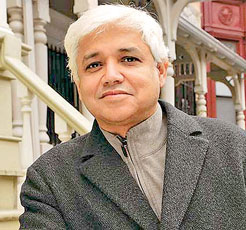Amitav Ghosh’s tangled paths of modernity
[Part 2]
 So
far, I have been discussing the nature and significance of Amitav Ghosh
as a writer and his recognisable strengths and weaknesses. What I wish
to do now is to examine possible ways in which we in Sri Lanka - both
writers and readers - can draw important lessons from his creative and
interpretive efforts. To understand him and see possible ways of drawing
upon his writings, we need to re-contextualise him and examine the most
productive ways in which he can be turned into an object of critical
study. There is a crying need, in his case, for bold re-contextualisations
and imaginative re-interpretations of his work. So
far, I have been discussing the nature and significance of Amitav Ghosh
as a writer and his recognisable strengths and weaknesses. What I wish
to do now is to examine possible ways in which we in Sri Lanka - both
writers and readers - can draw important lessons from his creative and
interpretive efforts. To understand him and see possible ways of drawing
upon his writings, we need to re-contextualise him and examine the most
productive ways in which he can be turned into an object of critical
study. There is a crying need, in his case, for bold re-contextualisations
and imaginative re-interpretations of his work.
Terry Eagleton the distinguished British literary critic once said
that, ‘criticism is not an instrument or passage to the truth of a text,
but a transformative labor which makes its object appear other than it
is.’ This transformative labor, when reading Amitav Ghosh’s writings,
needs be prized very highly.
|

Amitav Ghosh |
What this means is that we need to correlate his formal
experimentations and linguistic innovations with the content and
animating ideology of his work. How social contradictions and historical
anxieties impinge on his consciousness and shape his narrative
structures and linguistic registers have to be de-coded very carefully.
In other words it is of paramount importance that we engage in a
symptomatic reading. As Fredric Jameson rightly points out, a
symptomatic reading seeks ‘to restore to the surface of the text the
repressed and buried reality of this fundamental history.’
I said earlier that it is important that we examine experimentations
in language and narrative strategy as a way of gaining entry into the
deeper layers of meaning embedded in the content. As I pointed out
earlier, Ghosh very often forsakes a straightforward and linear
narrative and fashions a fragmented narrative with complex temporal
juxtapositions. This is a way of enacting his doubts about unified
histories, historical certitudes that we very often have unquestioningly
taken for granted. His reluctance to subscribe to a unified and
authoritative history and instead foreground a relative, fragmented and
provisional one is important. And this desire finds articulation in his
technique and verbal registers. Here is one instance where we as Sri
Lankan writers and readers can draw on his work.
Authorial choices
It is evident that very often narrative structures carry within
themselves certain authorial choices that illuminate the writer’s value
systems. We as readers should be alert to this phenomenon. When we
explore the narrative structures in novels such as The Shadow Lines, The
Circle of Reason and Calcutta Chromosome, we see haw they embody and
enact certain constellation of values. This offers us useful insights
into the dynamics of productive reading. This question of narrative
structure is intimately related to the power of descriptions which Ghosh
possesses in abundance. In his novels, as indeed in most well-crafted
novels, descriptions come across as subjective, partial, value-laden;
descriptions can be regarded as sites of meaning which draw in the
reader inexorably.
And any ideological reading of a novel by Ghosh or any other novelist
should engage the ideology invariably embedded in it. In this regard, it
is important to bear in mind the fact that descriptions, forms and
ideologies do not always cohere; at times, they generate tension. We
must be alert, as readers, to these diverse possibilities. These are
useful lessons for Sri Lankan writers and readers of fiction.
Attention
Another facet of Ghosh’s writing that merits our closest attention is
the way he approaches the problems of post-coloniality. Although some of
the incidents in his fiction take place before the de- colonisation
process had begun, his works can be usefully located within an
analytical frame of post-colonilaity. Broadly speaking, there are two
main approaches to questions of fiction and post-colonialism. The first
can be described as the liberal-humanistic approach which focuses in
individual consciousness and cross-cultural issues. The second can be
described as the colonial deterministic approach which focuses on the
discursive production of colonial and post-colonial societies; it can be
said that Ghosh favors the second approach, although he is fully aware
of its limitations.
Amitav Ghosh seeks to transcend the limitations associated with the
discursive determinism of the second approach by granting the reader a
great measure of interpretive freedom. Texts invariably contain, despite
the best intentions of their authors, gaps, fissures, fault lines and
ambivalences, and it is the duty of the reader to occupy these gaps and
make use of them for the purpose of advancing his or her
interpretations. In addition, Ghosh, like Homi Bhabha and other cultural
critics, believe that there is no simple antipathy between coloniser and
colonised; the interaction is far more complex than a surface
acquaintance would have us believe. The ambitions and desires of the
colonizer intersect with the ambitions of and desire of the colonized.
This idea runs through many of Ghosh’s novels. Hence, when we in Sri
Lanka seek to construct frame of intelligibility to encompass and give
definition to post-colonial texts we can turn to Amitav Ghosh for some
guidance.
The idea of modernity, or to be more specific cultural modernity, as
I stated earlier, is central to Amitav Ghosh’s body of writings.
To be continued |


